Catholic Bishops in Nigeria should be preoccupied with the need for the Synod on Synodality to “be a journeying together within tradition and not away from tradition,” he said, and cautioned against the carrying out of “pastoral work without doctrine”, the exercising of “the will without the intellect.”
 Credit: Nigeria Catholic Network
Credit: Nigeria Catholic Network
Alluding to the agenda of leaving no one behind that the Synod on Synodality discourse has emphasized, Fr. Akinwale said, “It seems a current climate of antipathy to the intellect has engendered an ‘all are welcome’ inclusivism. All are welcome into the Church. But not all who were invited accepted the invitation. Some, like the rich young man, ‘went away sad.’”
He urged CBCN members to be cautious about undermining the need for repentance on the part of followers of Jesus in general and church members in particular.
“The imperative of repentance and the invitation to discipleship go hand-in-hand. In fact, if we are to go by the chronology of Mark’s Gospel, the imperative ‘repent’ was spoken by Jesus before the imperative ‘follow me’. Discipleship comes with a cost,” the pioneer DVC of Augustine University said.
(Story continues below)
 Credit: Nigeria Catholic Network
Credit: Nigeria Catholic Network
He continued, “The Church, like her Lord, must be honest to those who are invited, those she wants to include, by letting them know that discipleship comes with a cost. It is the imperative of evangelical honesty. To follow Jesus is to repent, and to repent is to follow Jesus. To be admitted into his community of disciples is to part with a past that is incompatible with the Gospel.”
“As the synodal Church journeys through history, in order not to take a wrong route, she must be guided by the word of God in Scripture and Tradition,” the Nigerian OP member, who has served as President of the Dominican Institute Ibadan in Nigeria further said, and added, “We must walk together with those who have interpreted apostolic doctrine before us ... We must walk with those who began the conversation before we arrived. That is synodality in time.”
Reflecting on “the virtue of listening to each other” that the Synod on Synodality fosters, he cautioned against the presumption that “our generation, or this Synod on Synodality is the first to listen”, which he said “may border on arrogance” and “would portray an absence of synodality in time.”
 Credit: Nigeria Catholic Network
Credit: Nigeria Catholic Network
“Indeed, if we have been listening, we would have known that we are not the first to listen,” Fr. Akinwale said, emphasizing the need to take into account “Synodality in time”.
He added, “Apart from synodality in time, there must also be synodality in space. In concrete terms, there must also be synodality with local Churches in Africa and in the global south whose voices have been drowned by the voices of some local Churches in the global north in the build up to this synod.”
“Will the south be allowed to speak? Will the north listen to the south?” the OP member posed, adding that the questions “demand yes or no answers” and that “unless answers to those questions are positive, synodality runs the risk of being reduced to a slogan.”
 Credit: Nigeria Catholic Network
Credit: Nigeria Catholic Network
“Despite all profession and appearances of inclusivity, this synod turns out to be insufficiently inclusive,” he observed, and referring to Nigeria, posed, “How much input did the man or woman in the pew make in the discussion of the Lineamenta, and in the construction of the Instrumentum Laboris? Did they even know that a synod was being prepared? We in the Church in Nigeria need to interrogate ourselves: how prepared were we for the first session? It’s not just about the preparation of clerics, but about preparation of the whole Church, of the laity and of consecrated persons?”
The Nigerian scholar, who, on 7 June 2023 received the academic title, Magister in Sacra Theologia (STM), the honorary Master of Sacred Theology title that Dominicans bestow on their distinguished scholars used the example of Fiducia Supplicans (FS) to fault the Synod on Synodality’s agenda, processes, as well as choice of resource persons.
“The synod looks like a fixed match. Its objective seems to be fixed already,” he said, and referring to the December 18 Declaration of the Vatican Dicastery for the Doctrine of Faith (DDF) permitting members of the Clergy to bless “same-sex couples” and couples in other “irregular situations”, explained, “The fact that while the first session of the synod was on, redaction of the Declaration Fiducia Supplicans was on, without the knowledge or input of synodal delegates and episcopal conferences raises a question: are we really journeying together?”
 Credit: Nigeria Catholic Network
Credit: Nigeria Catholic Network
He further posed, “Does the timing of publication of Fiducia Supplicans not suggest that it is intended to preempt discussions in the second session of the Synod on Synodality? Does its redaction without consultation not negate the spirit of synodality?”
Fr. Akinwale weighed in on the “tone, logic and content” of FS, the Vatican document that has elicited mixed reactions and deep division among Catholic Church leaders since it was released, and later clarified.
FS, he said, “manifests a disconnect between doctrine and pastoral praxis. While it reaffirms the doctrine that marriage is permanent and indissoluble union of a man and a woman, its affirmation of the possibility of blessing same-sex couples undermines the doctrine it reaffirms.”
 Credit: Nigeria Catholic Network
Credit: Nigeria Catholic Network
“If we as a Church embrace a pastoral praxis that undermines our doctrine, if our pastoral praxis is at odds with the doctrine we preach, it is our credibility itself that is undermined,” the Nigerian Catholic Priest said.
Referring to the 42-page “Synthesis Report” published on 28 October 2023, he added, “The Synthesis published at the end of the first session is already hinting at modification of the Code of Canon Law. Would that be a way of grasping what could not be possessed at the Synod? Would it be a way of canonizing what could not be passed through the synod?”
Regarding the need to look inwards, a third concern he wants Catholic Bishops in Nigeria to be preoccupied with ahead of the October Synodal assembly, Fr. Akinwale highlights the “encouraging and discouraging news at home”.
 Credit: Nigeria Catholic Network
Credit: Nigeria Catholic Network
The compilation of data by the Center for Applied Research in the Apostolate (CARA) at Georgetown University published in January 2023 showing Nigeria as the clear leader of countries having the highest proportion of Catholics who attend Mass weekly or more, the enthusiasm of the laity in the country, and the fact that “there are Nigerian missionaries on every continent, and many of them are exemplary agents of evangelization where they are” combine as good news for Africa’s most populous nation, Fr. Akinwale told CBCN members during his February 19 presentation.
“Yet, in looking inwards, we must not ignore what discourages,” he said, and went on to warn about “an explosion of new religious communities” and the invasion of Pentecostalism, describing the latter as “a greater concern than blessing of same-sex couples”.
 Credit: Nigeria Catholic Network
Credit: Nigeria Catholic Network
“We would be living in veritable synodality if we would allow the truth of the Gospel, as unfashionable as it is, to find us, if we would be humble enough to allow the truth to find us. For the Gospel is not truth we have found but Truth who has found us,” Fr. Akinwale said.
He added, “The Church in Nigeria in particular, must have the courage of martyrs of old in receiving, preserving and transmitting the Gospel that comes to us from the apostles. She will exercise this courage by identifying, raising and addressing issues of concern for apostolic tradition, for the synodal process, and for social and ecclesial realities that confront her.”
Nicholas Waigwa contributed to the writing of this story
ACI Africa was founded in 2019. We provide free, up-to-the-minute news affecting the Catholic Church in Africa, giving particular emphasis to the words of the Holy Father and happenings of the Holy See, to any person with access to the internet. ACI Africa is proud to offer free access to its news items to Catholic dioceses, parishes, and websites, in order to increase awareness of the activities of the universal Church and to foster a sense of Catholic thought and culture in the life of every Catholic.
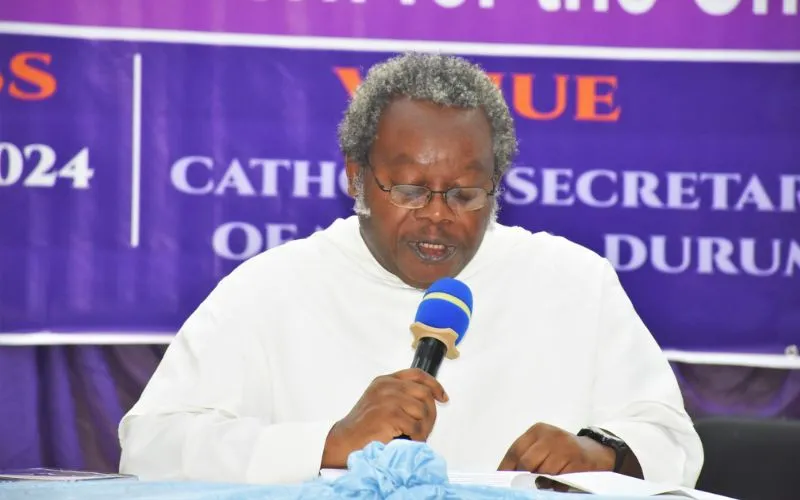 Fr. Anthony Akinwale. Credit: Nigeria Catholic Network
Fr. Anthony Akinwale. Credit: Nigeria Catholic Network


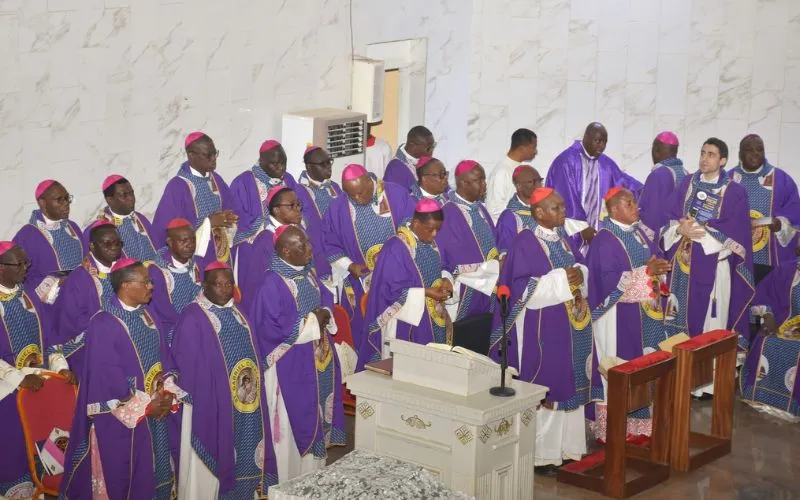
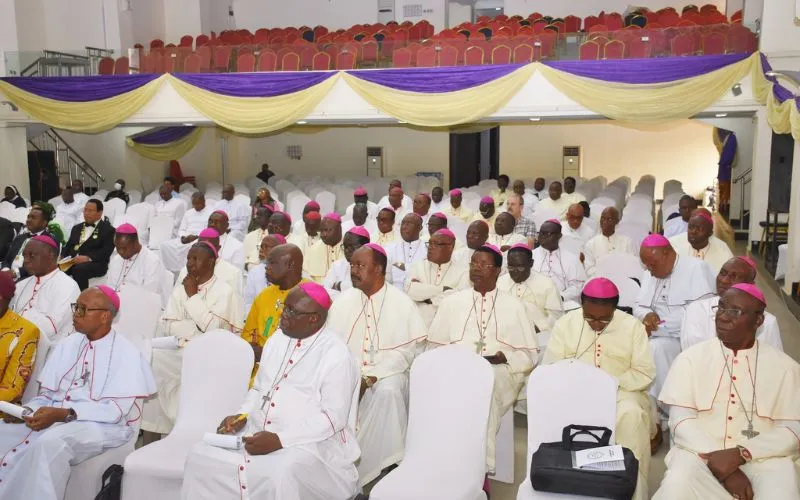 Credit: Nigeria Catholic Network
Credit: Nigeria Catholic Network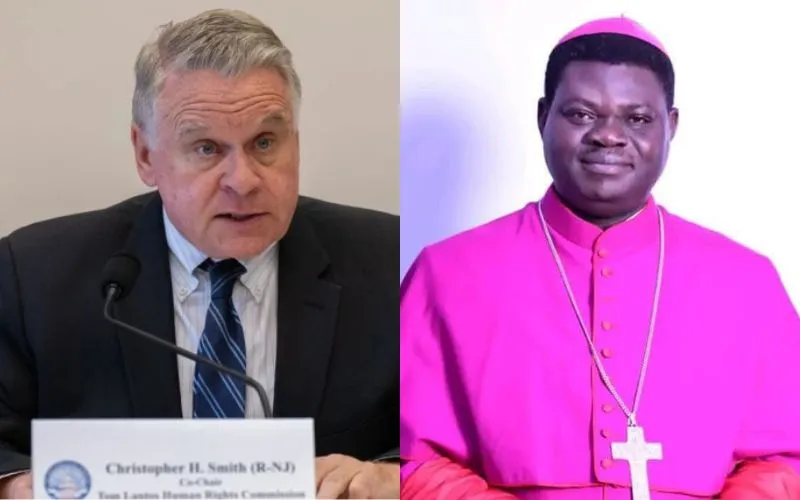
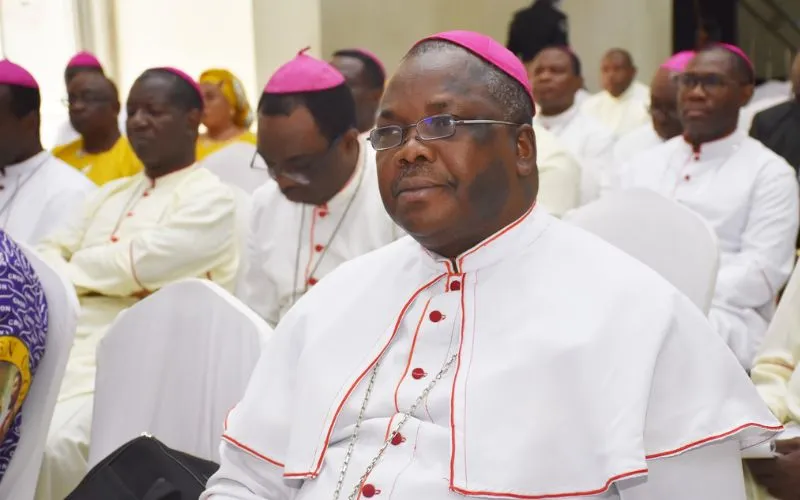 Credit: Nigeria Catholic Network
Credit: Nigeria Catholic Network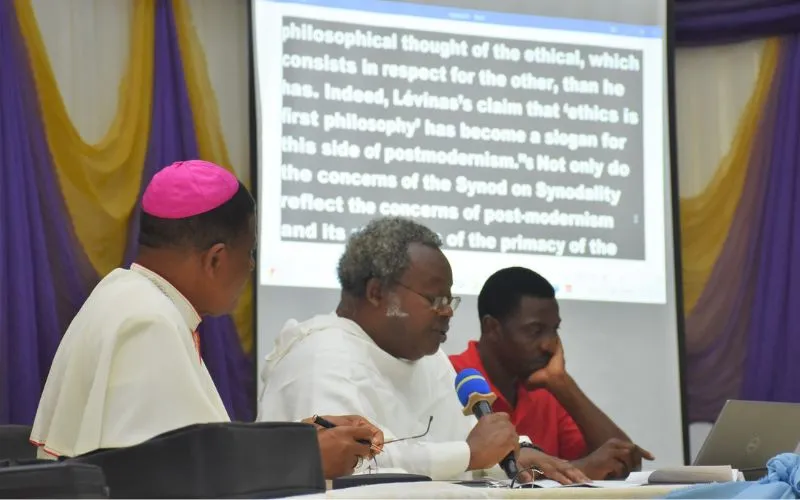 Credit: Nigeria Catholic Network
Credit: Nigeria Catholic Network Credit: Nigeria Catholic Network
Credit: Nigeria Catholic Network Credit: Nigeria Catholic Network
Credit: Nigeria Catholic Network Credit: Nigeria Catholic Network
Credit: Nigeria Catholic Network Credit: Nigeria Catholic Network
Credit: Nigeria Catholic Network Credit: Nigeria Catholic Network
Credit: Nigeria Catholic Network Credit: Nigeria Catholic Network
Credit: Nigeria Catholic Network Credit: Nigeria Catholic Network
Credit: Nigeria Catholic Network Credit: Nigeria Catholic Network
Credit: Nigeria Catholic Network


